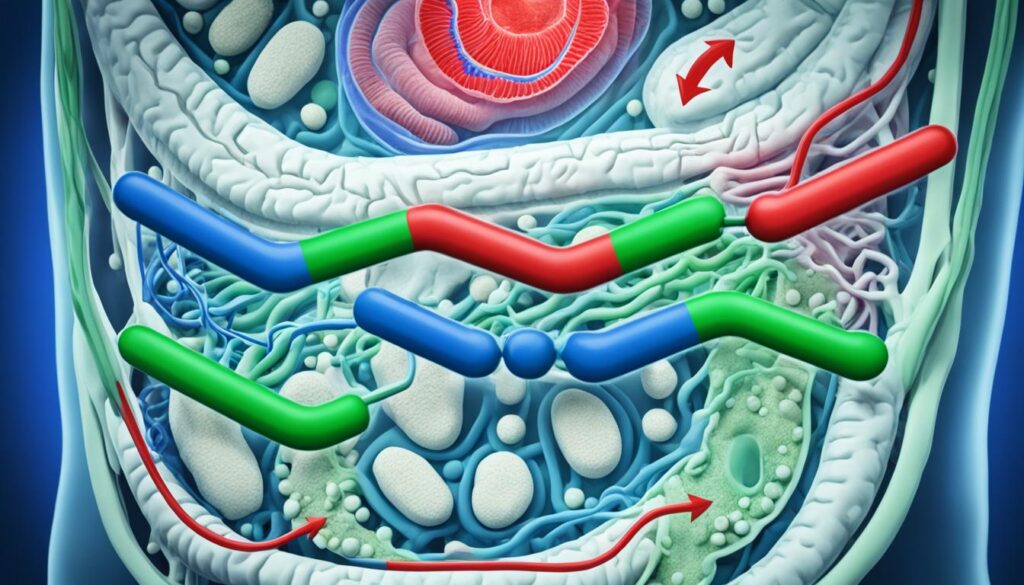Bowel cancer, or colorectal cancer, can be very serious. It affects the large intestine and the rectum. It ranks third as the most widespread cancer and second in cancer-related deaths. Stomach noises, like gurgling and rumbling, are often normal. But they can also point to health problems. So, is bowel cancer a cause of these sounds?
In its early stages, colorectal cancer might not show any signs. But as it grows, symptoms like stomach noises can appear. These sounds come from gas and moving substances in the bowels. They’re usually joined by other symptoms. These include blood in stool, bowel movement changes, and stomach pain.
So, do these noises mean you have bowel cancer? While unusual stomach sounds, along with blood in stool and stomach pain, are worrying, they might not be cancer. Many other issues can cause stomach noises. These include irritable bowel syndrome (IBS), food sensitivities, and gut infections.
Keep in mind, stomach noises aren’t a direct tell of bowel cancer. But if these sounds come with other symptoms, like bowel changes or weight loss, it could indicate a serious issue. It’s best to see a doctor for a closer look.
Key Takeaways:
- Bowel cancer can lead to stomach noises, like gurgling, as it impacts normal bowel function with time.
- Stomach noises by themselves don’t confirm bowel cancer. They might signal irritable bowel syndrome or gut infections instead.
- If stomach noises pair up with changes in bowel habits, blood in stool, or abdominal pain, seeing a doctor is a good idea.
- Spotting symptoms early is key for quickly diagnosing and treating bowel cancer.
- Screenings are wise for those at average risk by the age of 45 to 50. They can help find bowel cancer early, leading to better treatment success.
Symptoms of Bowel Cancer
Recognizing the symptoms of bowel cancer early is important. This helps in getting the right treatment fast. While symptoms vary for each person, there are common ones to watch for.
Some signs of bowel cancer are changes in bowel movements. This could mean you have ongoing diarrhea or constipation. If you see blood in your stool, whether red or dark, it could be a sign.
Feeling pain or cramps in your stomach regularly might also be a symptom. If you’re losing weight without trying, or you have ongoing tiredness, it’s wise to get checked out.
- Changes in bowel movements: Bowel cancer can cause changes in bowel habits, such as persistent diarrhea or constipation.
- Blood in the stool: This may appear as either bright red blood or dark, tarry stools.
- Abdominal pain or discomfort: Persistent abdominal pain or cramps can signal bowel cancer.
- Unexplained weight loss: A sudden drop in weight without effort might be a symptom.
- Fatigue or weakness: Persistent tiredness or weakness could be caused by bowel cancer.
Not everyone with bowel cancer shows symptoms early on. This is why regular screenings are key. Remember, other gut issues can sometimes cause these symptoms. So, seeing a doctor for a proper check is important if you’re worried.
Stomach Noises and Bowel Cancer
The link between bowel cancer and stomach noises is not totally clear. But, doctors think that cancer in the colon or rectum can change how the bowels work. This can make the stomach noisy. Sometimes, a tumor might block part of the intestine, leading to loud stomach sounds and digestive trouble.
Knowing the difference between usual stomach noises and ones related to cancer is key. If stomach noises get worse, or you hear them with blood in your stool or belly pain, see a doctor. They can tell you what’s going on.
Early colorectal cancer might not show any clear signs. This makes it vital to notice even small bowel changes or louder stomach sounds. Illnesses like inflammatory bowel disease can make your stomach noisy too.
Often, a health issue causes extra loud stomach noises. Seeing a doctor can help. Also, what you eat matters. Too much fructose or sorbitol can add to stomach noises. So, eat well for a happy gut.
Colorectal cancer is a big worry in the U.S., ranking as the third top cancer in both men and women. With about 53,200 deaths each year, it’s a serious issue. We need to spread the word about the importance of early checks.
Age and family history affect your risk of getting colorectal cancer. It’s more common in those older than 50. Having a close relative with the cancer raises the risk. Unhealthy habits, such as a bad diet and lack of exercise, plus smoking and too much alcohol, can also up your odds.
Getting checked regularly is your best defense. Tests like colonoscopies can find cancer early. The Cancer Center for Healing in Irvine, CA, led by Dr. Leigh Erin Conneally, offers cutting-edge care. They use tests tailored to you for better treatment.
Understanding Stomach Noises
Stomach noises are common and part of our natural functions. When our digestive system works on food, these sounds happen. They can range from light rumbles to loud gurgles.
While most noises are harmless, too much noise might signal a problem. This could include issues with the stomach or even bowel cancer.
Bowel cancer might change bowel habits or cause a growth that disturbs the stomach. But, stomach sounds alone aren’t a clear sign of cancer. It’s key to watch for other signs too, like pain or bowel habit changes.
Conditions like ulcerative colitis can create stomach sounds along with other gastro issues. If there’s a family history of bowel cancer, the risk rises. Keeping track of stomach changes and seeing a doctor if things seem off is crucial.
Working on health issues or changing diet can quiet the stomach. For anyone bothered by constant stomach sounds, it’s wise to see a doctor. Tests can pinpoint any gut issues that might be causing the noise.
Knowing what stomach sounds can tell us might help spot serious issues early. Always stay in touch with your healthcare team. Taking action if any symptoms worry you is a smart move.
Risk Factors for Bowel Cancer
Bowel cancer is the fourth most common cancer in Australia. It affects thousands each year. Knowing the risks can help you lower your chance of getting it. You can also make sure to do the right screenings.
Age and Family History
Bowel cancer mostly hits people over 50. If someone in your family had it, your risk goes up. The risk is highest if it was your parent or sibling.
Genetic Mutations
Some genes can make you more likely to get bowel cancer. Even if it doesn’t run in your family, these genes can raise your risk. Conditions like Lynch syndrome and familial adenomatous polyposis make bowel cancer more likely.
Poor Diet and Inactivity
Diets low in fiber and high in red meat can raise your risk. Not being active can also make this cancer more likely. Eating well and moving a lot help lower these risks.
Obesity
Being too heavy or obese can greatly increase your risk of bowel cancer. Extra fat, especially around your stomach, can help cancer grow. Staying at a healthy weight with good eating habits and exercise helps lower this risk.
Smoking, Alcohol Consumption, and Inflammatory Bowel Disease
Smoking and drinking a lot can increase your risk. So can having diseases like ulcerative colitis and Crohn’s disease. It’s important to treat these conditions well to lower your risk.
Knowing about these risks means you can work to avoid them. Living healthy, getting the proper checks, and talking to doctors can help. This way, you can catch and treat bowel cancer early if it ever happens.
The Link Between Stomach Noises and Bowel Cancer
Stomach noises on their own don’t show someone has bowel cancer. But, if you have stomach sounds and other issues, like pain, changes in your bathroom routine, or seeing blood, you should worry. These signs might point to a blocked bowel which is linked with later stage bowel cancer.
Your gut’s grumbles might come from gas moving through it because of changes in your bowel or a tumor. These sounds aren’t always bad. They can happen from eating certain foods, like those high in fructose. Diseases such as ulcerative colitis and Crohn’s may also be to blame for the noises and other stomach problems.
Finding and solving the root issue can quell rumbling in your tummy. Remember, there’s not a direct cure for loud stomach sounds. Sometimes, doctors need to run tests to find out what’s really going on.
Bowel cancer can shake things up in your stomach. It can cause sounds, blood in the bathroom, belly pain, feeling tired, or changes in your poop. These signs don’t always mean cancer but are worth checking out with a doctor.
Seeing an unusual change in your stomach noise along with pain is a red flag. These could mean your bowel is blocked, often a sign of advanced cancer. Paying attention to these early signs is key to catching and treating cancer early.
The Diagnostic Process for Bowel Cancer
Diagnosing bowel cancer involves multiple steps to check for cancer cells and see how much it has spread. The process includes a colonoscopy, imaging tests, and a biopsy.
Colonoscopy:
Colonoscopy is a key test to look for signs of cancer in the large bowel. A long, flexible tube, called a colonoscope, is used. It has a light and a camera. The doctor looks for any issues and may take small samples for testing.
Imaging Tests:
Imaging tests are important to see the stage of the cancer. CT colonography, CT scans, PET-CT scans, MRI scans, and ultrasounds can be used. They provide detailed pictures of the colon and other body parts. This helps to spot cancer and figure out its stage.
Biopsy:
A biopsy is done to check for cancer cells. A small piece of tissue is taken from somewhere suspicious. This could be found during a colonoscopy or from imaging tests. A pathologist then looks at the tissue under a microscope to find out if it’s cancerous.
Other tests like blood tests are also done. These check your overall health and how well your organs are working. There are tests to see the cancer’s stage by studying its genes. And, tumor markers like carcinoembryonic antigen (CEA) are checked to see how well treatment is going.
The test process for bowel cancer uses a mix of methods. It includes colonoscopy, imaging, and biopsy. These steps help doctors find and understand the cancer. Finding it early and knowing its stage is important for the right treatment and a better chance at recovery.
Identifying Early Warning Signs of Bowel Cancer
Spotting bowel cancer early helps in treating it successfully. By recognizing early warning signs, people can get checkups fast and better the results. Be on the lookout for any changes in bowel habits, blood in the stool, and weight loss without a clear reason.
Everlasting constipation, diarrhea, or just a change in how often you go can point to colorectal cancer. If you notice these shifts, don’t ignore them.
If you see blood in your stool, act on it. Although it might be from something less severe like hemorrhoids, it could mean bowel cancer. Always consult a healthcare expert.
Unexplained shedding of pounds is something to pay attention to. With bowel cancer, weight loss may happen because tumors mess with nutrient absorption or your body needs more energy.
Don’t wait to get checked if you start seeing any of these signs. This includes weird changes in bowel habits, bloody stool, any odd digestive sounds combined with weight loss or feeling tired, or any other new, persistent symptoms.
It’s a good idea to get screened for bowel cancer starting at 45 to 50 years old. Talking to a healthcare provider will guide you to the right tests. Early discovery makes treating the cancer easier and improves your chance of recovery.
Consultation with a Healthcare Professional
If you think you might have bowel cancer, talk to a healthcare pro soon. Don’t ignore funny stomach sounds, especially if they come with other symptoms. They will check you out and suggest special tests, knowing your health story.
Finding bowel cancer early and knowing what might lead to it is critical for effective treatment. By getting checked fast, you up your chances for the best care.
Some folks with colorectal cancer don’t feel sick at first. That’s why regular check-ups are super important. If you see blood in your stool, poop differently, or hurt in your belly often, call a doctor right away.
Bad stomach sounds could point to bigger issues like inflammatory bowel disease. Or, changing what you eat might help. Talking to a pro can find out why your tummy’s loud and the best fix for it.
The Effects of Lifestyle Choices on Bowel Cancer Risk
Some lifestyle choices can greatly increase your chance of getting bowel cancer. These include smoking, drinking alcohol, not being active, and a bad diet. All of these are linked to a higher risk of getting this cancer.
Smoking is known to up your risk for many cancers, bowel cancer included. When you quit smoking, you not only lower your bowel cancer risk. You also get other health benefits. It’s key to stop smoking for your well-being and to cut cancer risk.
Drinking alcohol a lot, or often, is another choice that can raise your risk of bowel cancer. It ties into the chances of getting many types of cancer. To lower this risk, cut down on alcohol or quit.
In today’s world, many people don’t move around a lot. Not being active often is a big deal. It’s linked to more than just bowel cancer. Doing activities like walking fast, biking, or swimming can bring the risk down. It’s important to be active to stay healthy.
Eating poorly is a big factor in bowel cancer risks too. If your diet has too much red or processed meat, not enough fiber, fruits, and vegetables, you’re at higher risk. To lower the risk, eat a healthy diet. This means lots of fiber, fruits, and veggies, and less of the unhealthy meats.
Choosing a healthier lifestyle can cut your bowel cancer risk a lot. This means quitting smoking, drinking less, moving more, and eating well. These changes don’t just lower your cancer risk. They make you healthier overall.
Environmental Factors and Bowel Cancer
Some environmental factors might lead to developing bowel cancer. These include radiation and certain chemicals. It’s key to know about and reduce our exposure to these risks.
Radiation exposure is one such factor being studied. Long or high radiation levels from tests or jobs can up the cancer risk. It’s vital to stick to safety rules and cut down on radiation exposure.
Chemical exposure is another risk factor. Chemicals in water or at work might raise your bowel cancer risk. Knowing and avoiding these chemicals is important to lower the risk.
There’s also research on air pollution’s effect on bowel cancer. Initial findings hint that it might increase your risk. With pollution a big issue in towns, efforts to clean the air can lower this danger.
Still, bowel cancer risk isn’t just from the environment. Things like genetics, lifestyle, and other factors matter too. So, it’s vital to tackle all risks hand in hand, and to make healthy life choices.
Taking Preventive Measures for Bowel Cancer
It’s important to take steps to prevent bowel cancer. This helps lower your risk. If you’re older or have a family history of this cancer, you should get screened often. Screenings like FIT tests or colonoscopies can find cancer early, before it shows any symptoms. It’s key to start these screenings at age 45 to 50 if you’re at average risk. Talk to a doctor to figure out what’s best for you.
Finding cancer early is crucial for better treatment and survival chances. Know what to watch for: a change in bathroom habits, blood in the stool, stomach pain, losing weight for no reason, feeling tired, and if your stomach is not feeling empty after using the bathroom. If you notice these symptoms, you need to get checked out right away. This can lead to a treatment plan made just for you. It gives you the best shot at beating the cancer.
Get screened regularly and know the warning signs of bowel cancer. Watch your lifestyle too. Things like smoking, drinking too much alcohol, not moving enough, and a bad diet up your cancer risk. By making good choices, like quitting smoking and moving more, you can cut your risk of getting this cancer. Remember, keeping up with healthy habits is key in fighting off bowel cancer.




